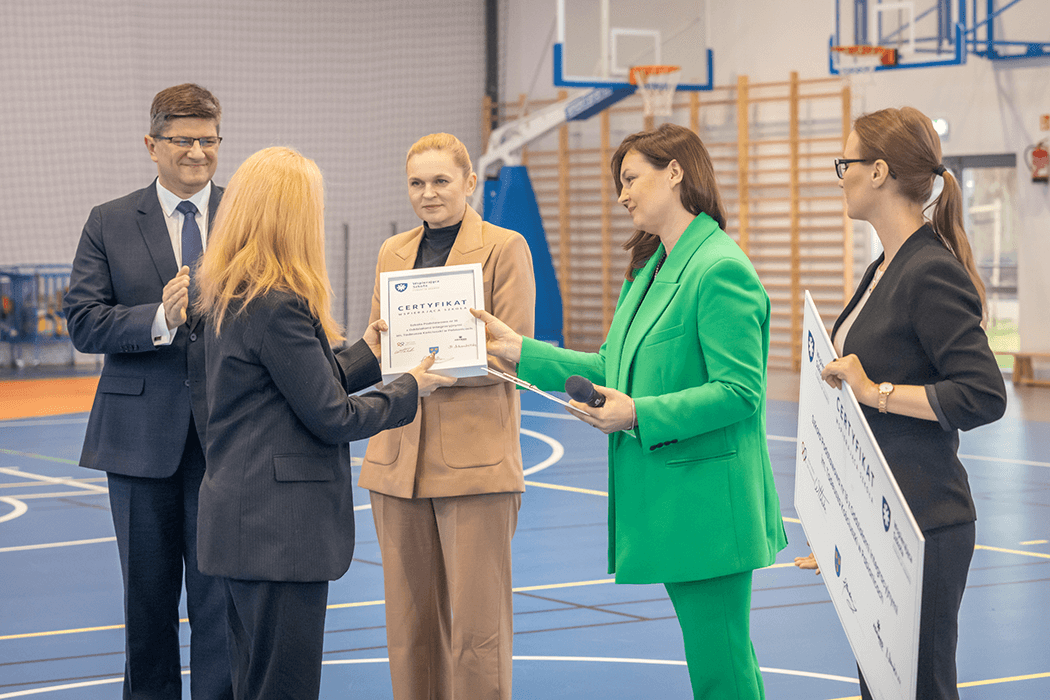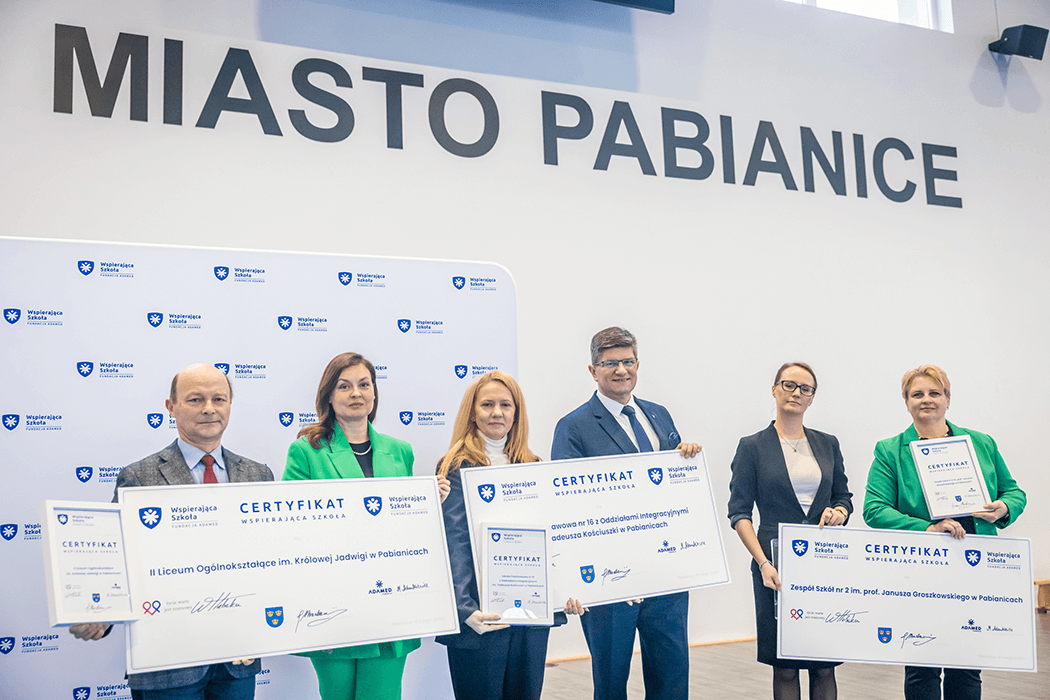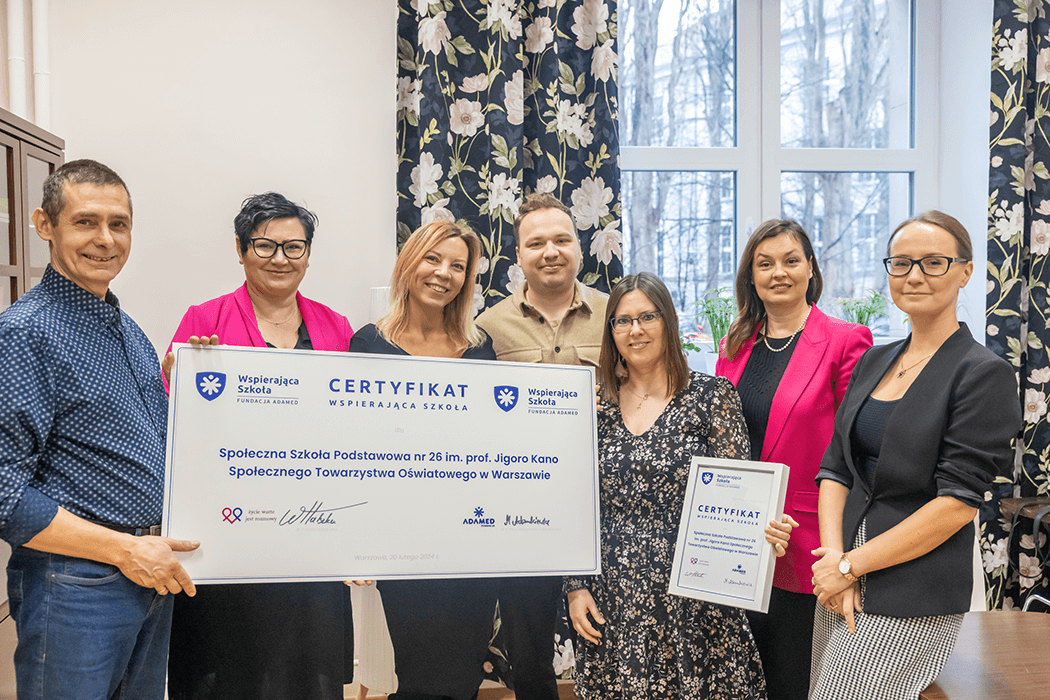Supportive School is a program addressed to primary and secondary schools. Within the framework of the program, teachers, educators, parents and students develop relevant knowledge and skills, and are provided with appropriate tools, for the care of the mental well-being of children and adolescents. Upon completion of the program, Supportive School certificates are awarded.
Supportive School is Poland’s first comprehensive program aimed at the prevention of suicidal behaviors among children and adolescents.


We raise awareness
of child and adolescent mental well-being among young people, parents, and teaching staff.
We provide tools
to prevent suicidal and self-destructive behaviors.
We teach how
to support young people in crisis, where to look for assistance and how to help.
What is included in the activity package for schools participating in the program:
A student in mental crisis – how to recognize them and provide support?
The aim of this training is to provide participants with the knowledge and tools necessary to identify and respond to mental crises in children and adolescents. Participants will learn about the symptoms that may be indicative of a mental crisis and about its long-term impact on a young person’s mental health and development. Specific strategies and interventions that may be used in case of a suspected crisis will be outlined, with emphasis on empathetic and effective approaches. In addition, the training will address when and how to seek external support, highlighting the resources available in and outside of school that may be helpful in providing comprehensive support to a student in a difficult situation. The goal is not only to help with the crisis but also to build mental resilience among the youth.
Parents of a student in mental crisis – how to motivate them to cooperate?
The training focuses on cooperation between teachers, school specialists and parents of students in mental crisis. During the training, participants will learn about what makes it hard for parents to accept information about the child’s difficulties, how to plan a conversation with their parent, how to support them and motivate them to cooperate. Recommendations that parents should receive at a meeting with a school specialist, as well as a community-based mental crisis assistance system for children, will be discussed.
A student after a suicide attempt – how to support them in returning to school?
The aim of the training is to equip the participants with the knowledge and tools necessary to identify and respond to mental crises in children and adolescents. Participants will learn about the symptoms that may be indicative of a mental crisis and about its long-term impact on a young person’s mental health and development. Specific interventions that may be used in case of a suspected crisis will be presented, with emphasis on an empathetic approach. In addition, the training will address when and how to seek external support, highlighting the resources available in and outside of school that may be helpful in providing comprehensive support to students in a difficult situation.
Teachers’ mental well-being – how to deal with stress and difficult emotions?
This training program focuses on understanding and managing emotions, particularly the difficult and unpleasant ones. Participants learn how to identify and understand their own emotions to better deal with stressful situations and life challenges. Techniques to quickly alleviate negative emotions that can be used in everyday situations to prevent their escalation and negative impact on mental health will be explored. In addition, the training program offers guidance on long-term strategies to reduce susceptibility to unpleasant emotional states. The goal is to provide participants with tools to better manage their emotions, improving their quality of life and mental health.
The aim of the meeting is to provide participants with a better understanding of self-destructive behaviors among children and adolescents, including suicidal behaviors and self-injury. The characteristics, scale and impact of such behaviors on young people’s health and well-being will be presented. Participants will also learn about the objectives and structure of the “Supportive School” program, which has been designed to prevent such problems through education and support. Various program elements will be discussed, including a four-part training course for teachers, webinars addressed to parents, online consultations opportunities for both groups of participants, as well as access to free educational materials. Special attention will be paid to the joint development of the crisis management process, so that school staff members are better prepared to identify and intervene in the event of self-injury.
The aim of the educational meeting for parents is to improve their understanding of how emotional crisis unfolds in children and adolescents. Participating in the meeting offers an opportunity to gain insights into the experiences of a young person going through distress, and to find solutions to issues that trouble adults. Moreover, parents will be provided with guidance on various approaches to addressing their child’s challenges and the available avenues of support, including finding help for themselves.
Free online consultations for parents and teachers provide the chance to have one-on-one sessions with a specialist in suicidology. During these sessions, all adults who reach out will have an opportunity to discuss the situation and emotional challenges facing their child/adolescent or student. The consultations revolve around topics including risk behaviors, self-harm, and suicidal tendencies. One of the benefits of the consultations, aside from access to specialist support, is a short waiting period.
Free online consultations for teachers, school counselors and psychologists will provide an opportunity to hold individual meetings with suicidology specialists. They are addressed to individuals who suspect they are experiencing symptoms of burnout or who feel an emotional burden associated with their work at school.
As part of the project, participating schools will have an opportunity to collaborate with a specialist in developing a crisis management procedure. The procedure will include step-by-step guidelines to follow and outline the responsibilities of individual staff members. By developing the procedure, schools are better prepared for handling instances of suicidal behavior, and teaching staff are equipped with the necessary guidance on how to approach such situations. The procedure is developed during online consultations.
Guide to Emotional First Aid contains instructions for adults on how to undertake various interventions with children and adolescents going through emotional crisis. The topics covered in the Guide include ways to identify emotional crisis in young people, effective communication strategies, and methods to develop positive relationships. The key strength of the Guide is its practical aspect. The tips can be applied immediately in day-to-day interactions with children and adolescents.
READ MOREGuide to Supporting Students after Suicide Attempt is aimed at teachers and school professionals. Topics covered in the Guide include the key actions that can be taken by teachers towards students after a suicide attempt, and useful tools for interaction and communication. Also included in this publication is a list of preventative measures that can be implemented within the school environment to reduce suicidal tendencies in young people.
READ MOREGuide on How to Talk to Parents of Students in Crisis is designed for teachers and school professionals. The guide focuses on issues related to understanding the nature of resistance in the parents of children in crisis, and ways to identify signs of parental resistance and address them competently. An essential component of the publication is an exploration of the rules of collaboration and motivational strategies for engaging resistant parents.
READ MOREPeer Support is a guide intended for young people who interact every day with peers struggling with emotional difficulties. The content presented in the guide centers on three main areas: how to identify a crisis among peers, how to communicate effectively with peers experiencing a crisis, and how to show them support and provide assistance. The guide is designed to provide young people with useful advice and resources to respond appropriately when faced with an emotional crisis within their peer group.
READ MOREEvery school which participates in the meeting for school principals, 4 staff training courses and meeting for parents, and which develops a crisis intervention procedure, will be eligible for the “Supportive School” Certificate.
The “Supportive School” pilot program was implemented from September to December 2023 in five schools in the Mazowsze and Łódź Regions. In total, more than 170 teaching staff members and 150 parents attended over 80 hours of training. In addition to courses taught by experienced practitioners and experts in the field of suicidology, the institutions also received professional support with the development of a crisis intervention procedure and with the establishment of a crisis team for the school, as well as access to educational materials developed specifically for the “Supportive School” program.
The schools which took advantage of the full package offered under the program received the “Supportive School” Certificate. On 19 February 2024, principals of three schools from Pabianice received their certificates in the presence of representatives of the Ministry of National Education, including Minister Barbara Nowacka, the Mayor of Pabianice, representatives of the Polish Parliament, members of the Adamed Foundation and the Życie Warte Jest Rozmowy website. The schools included: Tadeusz Kościuszko Primary School No. 16 with Integration Branches, Queen Jadwiga High School No. 2 and Professor Janusz Groszkowski School Complex No. 2.
The “Supportive School” certificate was also awarded to Professor Jigoro Kano Charter School No. 26 in Warsaw.



Be a Supportive School for your students!

Team
Our team is made up of experts in the field of suicidology, members of the Polish Association of Suicidology and specialists running the suicide help website.
Halszka Witkowska
PhD - suicidologist
Małgorzata Łuba
psychologist, suicidologist
Lucyna Kicińska
narrative therapist, suicidologist
Jolanta Palma
crisis intervener, suicidologist









